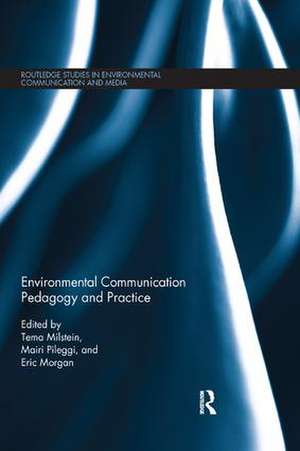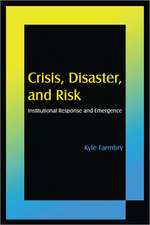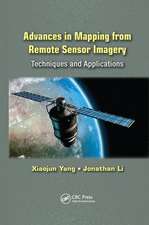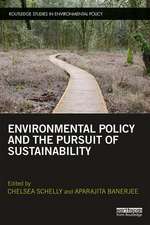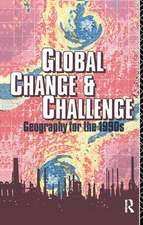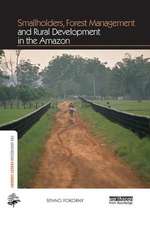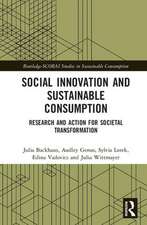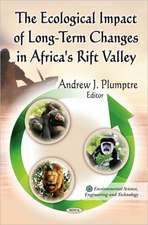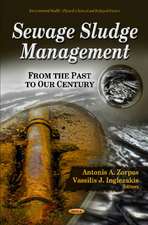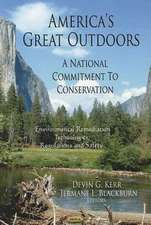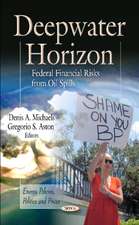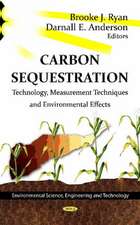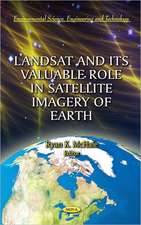Environmental Communication Pedagogy and Practice: Routledge Studies in Environmental Communication and Media
Editat de Tema Milstein, Mairi Pileggi, Eric L Morganen Limba Engleză Paperback – 27 sep 2018
The book brings together international educators working from a variety of perspectives to engage both theory and application. Contributors address how pedagogy can stimulate ecological wakefulness, support diverse and praxis-based ways of learning, and nurture environmental change agents. Additionally, the volume responds to a practical need to increase teaching effectiveness of environmental communication across disciplines by offering a repertoire of useful learning activities and assignments. Altogether, it provides an impetus for reflection upon and enhancement of our own practice as environmental educators, practitioners, and students.
Environmental Communication Pedagogy and Practice is an essential resource for those working in environmental communication, environmental and sustainability studies, environmental journalism, environmental planning and management, environmental sciences, media studies and cultural studies, as well as communication subfields such as rhetoric, conflict and mediation, and intercultural. The volume is also a valuable resource for environmental communication professionals working with communities and governmental and non-governmental environmental organisations.
| Toate formatele și edițiile | Preț | Express |
|---|---|---|
| Paperback (1) | 416.22 lei 6-8 săpt. | |
| Taylor & Francis – 27 sep 2018 | 416.22 lei 6-8 săpt. | |
| Hardback (1) | 849.77 lei 6-8 săpt. | |
| Taylor & Francis – 25 ian 2017 | 849.77 lei 6-8 săpt. |
Din seria Routledge Studies in Environmental Communication and Media
-
 Preț: 281.46 lei
Preț: 281.46 lei - 19%
 Preț: 268.59 lei
Preț: 268.59 lei -
 Preț: 380.95 lei
Preț: 380.95 lei -
 Preț: 348.67 lei
Preț: 348.67 lei -
 Preț: 389.38 lei
Preț: 389.38 lei -
 Preț: 449.41 lei
Preț: 449.41 lei -
 Preț: 347.41 lei
Preț: 347.41 lei -
 Preț: 384.86 lei
Preț: 384.86 lei - 16%
 Preț: 216.07 lei
Preț: 216.07 lei - 17%
 Preț: 259.98 lei
Preț: 259.98 lei -
 Preț: 389.66 lei
Preț: 389.66 lei -
 Preț: 412.37 lei
Preț: 412.37 lei - 18%
 Preț: 1057.89 lei
Preț: 1057.89 lei -
 Preț: 466.67 lei
Preț: 466.67 lei - 17%
 Preț: 258.91 lei
Preț: 258.91 lei -
 Preț: 416.22 lei
Preț: 416.22 lei - 16%
 Preț: 265.39 lei
Preț: 265.39 lei -
 Preț: 382.16 lei
Preț: 382.16 lei -
 Preț: 449.41 lei
Preț: 449.41 lei -
 Preț: 411.42 lei
Preț: 411.42 lei - 19%
 Preț: 259.10 lei
Preț: 259.10 lei - 19%
 Preț: 258.09 lei
Preț: 258.09 lei -
 Preț: 460.47 lei
Preț: 460.47 lei -
 Preț: 408.54 lei
Preț: 408.54 lei - 18%
 Preț: 1000.27 lei
Preț: 1000.27 lei - 18%
 Preț: 1053.92 lei
Preț: 1053.92 lei
Preț: 416.22 lei
Nou
Puncte Express: 624
Preț estimativ în valută:
79.64€ • 83.15$ • 65.92£
79.64€ • 83.15$ • 65.92£
Carte tipărită la comandă
Livrare economică 05-19 aprilie
Preluare comenzi: 021 569.72.76
Specificații
ISBN-13: 9781138393509
ISBN-10: 1138393509
Pagini: 300
Dimensiuni: 156 x 234 x 16 mm
Greutate: 0.45 kg
Ediția:1
Editura: Taylor & Francis
Colecția Routledge
Seria Routledge Studies in Environmental Communication and Media
Locul publicării:Oxford, United Kingdom
ISBN-10: 1138393509
Pagini: 300
Dimensiuni: 156 x 234 x 16 mm
Greutate: 0.45 kg
Ediția:1
Editura: Taylor & Francis
Colecția Routledge
Seria Routledge Studies in Environmental Communication and Media
Locul publicării:Oxford, United Kingdom
Public țintă
PostgraduateCuprins
Introducing Environmental Communication Pedagogy and Practice
Section One: (Re)conceptualizing the Environmental Communication Classroom
Chapter 1. From Negotiation to Advocacy: Linking Two Approaches to Teaching Environmental Rhetoric.
Chapter 2. Pedagogy as Environmental Communication: The Rhetorical Situations of the Classroom. Chapter 3. Environmental Communication Pedagogy: A Survey of the Field.
Chapter 4. Breathing Life into Learning: Ecocultural Pedagogy and the Inside-Out Classroom.
Section Two: Diverse Practices in Teaching Environmental Communication
Chapter 5. The Role of Social Constructionism as a Reflexive Tool in Environmental Communication Education.
Chapter 6. "Deep Impressions": The Promise and Possibilities of Intercultural Experiential Learning for Environmental Literacy and Language Attitudes. Chapter 7. Further Afield: Performance Pedagogy, Fieldwork, and Distance Learning in Environmental Communication Courses.
Chapter 8. Arts-Based Research in the Pedagogy of Environmental Communication.
Chapter 9. Developing Visual Literacy Skills for Environmental Communication.
Chapter 10. Teaching Environmental Journalism Though Distance Education.
Section Three: Transformative Practice: Nurturing Change Agents
Chapter 11. Changing Our Environmental Future: Student Praxis Through Community Inquiry.
Chapter 12. Storytelling as Action.
Chapter 13. Insider Windows in Nepal: A Critical Pedagogy for Empowering Environmental Change Agents.
Chapter 14. Repair Cafés - Reflecting on Materiality and Consumption in Environmental Communication.
Chapter 15. Cultivating Pride: Transformative Leadership and Capacity Building in the Rare-UTEP Partnership.
Section Four: Environmental Communication Pedagogy and Practice Toolbox
Chapter 16. "Moral Vision Statement" Writing Assignment Instructions for Students.
Chapter 17. Environmental Privilege Walk: Unpacking the Invisible Knapsack.
Chapter 18. An Experiential Approach to Environmental Communication.
Chapter 19. Greening Epideictic Speech.
Chapter 20. Praxis-based environmental communication training: Innovative activities for building core capacities.
Chapter 21. Image(ination) and Motivation: Challenging Definitions and Inspiring Environmental Stakeholders.
Chapter 22. Using Infographics. Chapter 23. News Media Analysis.
Chapter 24. Newschart Assignment.
Chapter 25. Speaking for/to/as Nature.
Chapter 26. Creating Emotional Proximity with Environment.
Chapter 27. Growing up with Animals (on screens).
Chapter 28. The Student-Run Environmental Communication Blog.
Section One: (Re)conceptualizing the Environmental Communication Classroom
Chapter 1. From Negotiation to Advocacy: Linking Two Approaches to Teaching Environmental Rhetoric.
Chapter 2. Pedagogy as Environmental Communication: The Rhetorical Situations of the Classroom. Chapter 3. Environmental Communication Pedagogy: A Survey of the Field.
Chapter 4. Breathing Life into Learning: Ecocultural Pedagogy and the Inside-Out Classroom.
Section Two: Diverse Practices in Teaching Environmental Communication
Chapter 5. The Role of Social Constructionism as a Reflexive Tool in Environmental Communication Education.
Chapter 6. "Deep Impressions": The Promise and Possibilities of Intercultural Experiential Learning for Environmental Literacy and Language Attitudes. Chapter 7. Further Afield: Performance Pedagogy, Fieldwork, and Distance Learning in Environmental Communication Courses.
Chapter 8. Arts-Based Research in the Pedagogy of Environmental Communication.
Chapter 9. Developing Visual Literacy Skills for Environmental Communication.
Chapter 10. Teaching Environmental Journalism Though Distance Education.
Section Three: Transformative Practice: Nurturing Change Agents
Chapter 11. Changing Our Environmental Future: Student Praxis Through Community Inquiry.
Chapter 12. Storytelling as Action.
Chapter 13. Insider Windows in Nepal: A Critical Pedagogy for Empowering Environmental Change Agents.
Chapter 14. Repair Cafés - Reflecting on Materiality and Consumption in Environmental Communication.
Chapter 15. Cultivating Pride: Transformative Leadership and Capacity Building in the Rare-UTEP Partnership.
Section Four: Environmental Communication Pedagogy and Practice Toolbox
Chapter 16. "Moral Vision Statement" Writing Assignment Instructions for Students.
Chapter 17. Environmental Privilege Walk: Unpacking the Invisible Knapsack.
Chapter 18. An Experiential Approach to Environmental Communication.
Chapter 19. Greening Epideictic Speech.
Chapter 20. Praxis-based environmental communication training: Innovative activities for building core capacities.
Chapter 21. Image(ination) and Motivation: Challenging Definitions and Inspiring Environmental Stakeholders.
Chapter 22. Using Infographics. Chapter 23. News Media Analysis.
Chapter 24. Newschart Assignment.
Chapter 25. Speaking for/to/as Nature.
Chapter 26. Creating Emotional Proximity with Environment.
Chapter 27. Growing up with Animals (on screens).
Chapter 28. The Student-Run Environmental Communication Blog.
Recenzii
In summary, Environmental Communication Pedagogy and Practice promises to be a welcome resource for both educators and researchers in making accessible first-hand accounts of transformational EC practices and in the heuristic value of these accounts in responding to what its authors rightly believe are exigencies that call for awareness and intervention in public arenas. As such, this volume warrants serious attention from those who are committed to the ideals of ‘transformative learning’ and the cultivation of ‘ecological citizenship’.
James Robert Cox, University of North Carolina, Environmental Education Research Journaul
James Robert Cox, University of North Carolina, Environmental Education Research Journaul
Descriere
This book fills the need for a sustained discussion of environmental communication pedagogy primarily in universities but also with institutions and communities. Drawing on a variety of disciplinary perspectives from around the world, this book will be an essential resource for environmental communication educators.
